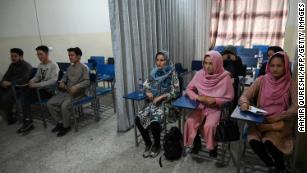Afghanistan's public universities opened on Wednesday with female students allowed back on campus for the first time since the Taliban took over the country last year.
The Taliban administration has not officially announced its plan for female university students, but education officials said women were permitted to attend classes on the condition they were separated from male students.
Khalil Ahmad Bihsudwal, the head of Nangarhar University, told Reuters male and female students at the institution would attend separate classes.
A female medical student at the university, who asked not be named for security reasons, said classes had been split by gender, but it was not clear if women could be taught by male lecturers or interact with male students outside the classroom.
"Only our studying shifts are separated, although we have been told not to walk around the university until the boys' time is complete," she said.
"Despite all the changes and conditions, I still want to continue because my education should not be incomplete."
Shaker Wahidi, an Afghanistan Ministry of Higher Education official told CNN public universities in warmer provinces -- in Nangarhar, Paktia, Paktika, and Kandahar -- would reopen to all male and female students from Wednesday.
He added that universities in the colder areas of the country would be opening in March for both men and women.
Temperatures have plunged well below zero in the coldest parts of Afghanistan during a winter plagued by food shortages and a lack of foreign aid that was withdrawn when the Taliban resumed power on August 15.
Under their previous rule from 1996 to 2001, the hardline Islamist Taliban barred women and girls from education. But the group has been vague on its plans for the education of girls and women during its new rule.
Some private universities have reopened, but in many cases female students have not been able to return to class, and in many provinces girls have still not been allowed to return to high school.
Bilal Karimi, Taliban deputy spokesman confirmed to CNN the Afghanistan Education Ministry is working on a plan to restart girls' secondary education for the new school year on March 21.
The Taliban have denied claims that Afghan girls would be banned from secondary schools but said they needed to set up a secure transportation system for female students before allowing them back into the classrooms.
Human rights lawyer and researcher with Amnesty International's Crisis Response Program Nicolette Waldman welcomed the university openings but said more guidance is needed for younger students.
"Now waiting for similar news on secondary schools, which the vast majority of Afghan girls are still blocked from attending. #LetAfghanGirlsLearn," Waldman tweeted.
The international community has made education of girls and women a key part of its demands as the Taliban seek more foreign aid and the unfreezing of overseas assets.
Aid groups have raised the alarm that the stalled financial system and a stark drop in foreign funding that used to form the backbone of the economy are creating a humanitarian catastrophe in the country, already battered by decades of war.
The United Nations late on Tuesday praised the inclusion of female students at public universities.
"Let's all support the return of Afghan young female and male students to the universities across Afghanistan," the UN's Secretary General's Special Envoy for Afghanistan, Deborah Lyons, added in a Tweet.
"Supporters can consider a range of scholarship programs and ongoing support to female and male professors," she said.
An education official who asked not be named because he was not authorized to speak to the media said universities had been given different options to keep female students isolated, including separated classes and staggered operating hours.
On Wednesday, the US Treasury Department said international banks can transfer money to Afghanistan for humanitarian purposes, and aid groups are allowed to pay teachers and healthcare workers at state-run institutions without fear of breaching sanctions on the Taliban, according to Reuters.
The UN said more than half the country's 39 million people suffer extreme hunger and the economy, education and social services are facing collapse. UN Secretary-General Antonio Guterres last week warned Afghanistan was "hanging by a thread."
Latest Stories
-
Joy FM Prayer Summit for Peace ends in electrifying worship and prayer
5 hours -
The Conscience of Leadership: A call to President Akufo-Addo on Ghana’s environmental devastation
5 hours -
Ghanaian youth unaware of their right to hold politicians accountable – Youth Bridge Foundation
6 hours -
Judge delays Trump sentencing for a third time
6 hours -
2024 WAFCON: Ghana drawn against defending champions South Africa in Group C
7 hours -
Photos from DW-JoyNews street debate on ‘galamsey’
7 hours -
Mimmy Yeboah: Blending heritage with global sophistication, confidence redefined through couture
8 hours -
100 Most Influential People Awards 2024: Brain Hill International School’s Director Mary Anane Awuku honoured
8 hours -
Akufo-Addo commissions 97-km Tema-Mpakadan railway line
8 hours -
Majority requests recall of Parliament
8 hours -
Kanzlsperger and Professor Quartey support WAFA with medical Donation
8 hours -
Gideon Boako donates 10 industrial sewing machines to Yamfo Technical Institute
9 hours -
‘Golden Boy’ Abdul Karim Razak honored at WAFU-B general assembly
9 hours -
Buipewura Jinapor secures Vice Presidential position in National House of Chiefs with record votes
9 hours -
2024 election: I want results to come out like ‘milk and honey’ – Toobu
9 hours

